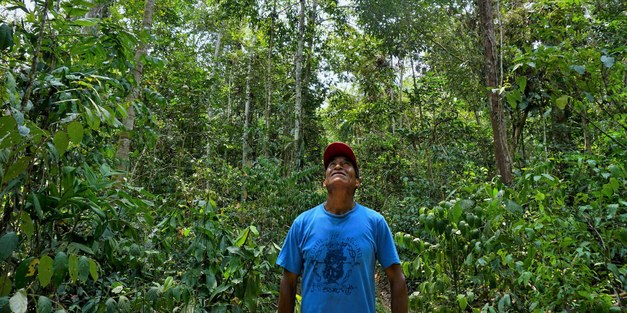
Mr. Melquiades, Brazil nut producer in Madre de Dios, Peru. Photo by Yoly Gutierrez/CIFOR
Forest Tenure Reform in the Amazon – A path to livelihoods and tenure security for local people?
Welcome to this Focali-LARRI-SIANI lunch seminar with guest speaker Iliana Monterroso from Center for International Forestry Research, CIFOR in Perú.
| What | Seminar |
|---|---|
| When |
Sep 27, 2019 12:00 AM
to Sep 27, 2019 02:30 PM |
| Where | GMV, Gothenburg Centre for Sustainable Development, Aschebergsgatan 44 Gothenburg |
| Contact Name | Sign up to: Maria Ölund |
| Contact Phone | 0766-22 92 22 |
| Attendees |
Dr. Iliana Monterroso, CIFOR |
| Add event to calendar |
|
- What has been the outcome of these reforms for the forest people themselves – for their livelihoods and tenure security?
- How is tenure security related to forest conditions and incentives for people to protect the forests?
- Are there links between tenure security issues and the current forest fires in different countries in the Amazon?

State any food preferences or allergies in the email.
Agenda:
12.00 Welcome to the seminar and lunch
Lasse Krantz, University of Gothenburg & LARRI and Maria Ölund, Focali
& SIANI
12.20 Introduction to the Amazon
region, current challenges and situation for indigenous groups
Torsten Krause, Associate Senior Lecturer LUCSUS - Lund University &
Focali
12.30 Formalization of indigenous
rights in the Peruvian Amazon: What we learned about forest tenure reform
emergence, implementation and outcomes?
Iliana Monterroso, Center for International Forestry Research, CIFOR Lima, Perú
13.15 Comments on the presentation by: Torsten Krause and Lasse Krantz
13.30 - 14.30 Coffee and open discussion moderated by: Lasse Krantz
Abstract to presentation by Iliana
Monterroso:
Globally, communities and indigenous peoples are estimated to hold as much as 65% of the available land under customary tenure but only 18% of this land has been formally recognized either as owned or designated for the use for indigenous peoples (RRI, 2015). In sub-Saharan Africa, as much as 70% of the land can be categorized as customary common property; nonetheless, only 3% of this land is formally recognized in law (Alden-Wily 2018). In contrast, Latin America has witnessed widespread policy reform, which has changed regulations that redefined tenure rights around forest lands (Roldan, 2004). As of 2015 nearly 33% of forests in the region were under some type of collective tenure regime owned by communities, most of which are of indigenous peoples, and another 6% was designed for their use. This portion of land represents above 60% of the global increase of forest under community ownership or control in the period of 2002-2015. This devolution process has taken place, drawing from a variety of institutional types: from collective land and territorial titling to co-management schemes and concession contracts that recognize lesser or temporary rights.
Peru has been at the forefront of Latin American countries with a large number of indigenous peoples lands titled in the Amazon. Since 1974, more than 2,000 communities have been titled over 11 million hectares. While this is an important progress, pending demands over recognition of indigenous lands has been estimated around 20 million hectares, about 1,000 communities are yet to be titled. Based on extensive research on forest tenure reforms by the Center for International Forestry Research, this presentation will draw results from a global comparative study on how reform around recognition of indigenous collective titling emerged and has been implemented in Peru. It will assess the progress and current constrains to implementation. It will also discuss challenges and opportunities to sustain outcomes on livelihoods and tenure security at the local level.
About
Iliana Monterroso:
Iliana Monterroso is an environmental scientist with the Equity, Gender, Justice & Tenures team. She is also the co-coordinator of Gender and Social Inclusion Research. She is part of the team that coordinates the implementation of the FTA strategy to strengthen partner organizations and CIFOR scientists to address gender and social inclusion across their research and ensure continuous learning and improvement. Iliana has a BSc in Biology and an MSc and PhD in Environmental Sciences. She has participated in global comparative studies that analyzed impacts of forest tenure reforms. She has extensive experience in facilitating multi-stakeholder platforms involving indigenous peoples, descendants and grassroots organizations. Her research focuses on gender, tenure, collective rights, environmental governance and socio-environmental conflicts predominantly in Latin America.
